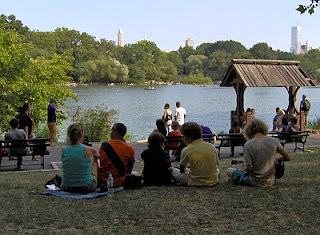Putting the pieces together, and looking through my note book after the writing workshop, I had to laugh out loud, when I realized how the bulldog poem had “materialized”:
Friday: A member of the writing group I attend sends some very sad poems. I wished I could make her laugh.
Friday evening: First encounter with the teacher of the writing workshop. He is very extrovert, intense, and not quite my vibe.
Saturday morning: On the way to the workshop, I see a bulldog who is tied to the door of a coffee shop and walks in when the door opens.
Writing workshop, morning session: The teacher gets in the way of my creative vibes. He talks too much. It’s all about dreaming, very introspective and personal, and I say to my friend I feel tempted to make up something really silly. My friend and I get reprimanded for talking. She doesn’t like it, either. I try to withhold judgement, give it a chance.
Lunchbreak: We’re supposed to look out for something during our lunch break that will inspire our writing. My friend and I agree we don’t like the workshop and would rather be home. Our conversation drifts off to e-harmony and my friend’s chances of getting married. Time is up before we know it. She decides to skip the afternoon session. I have to stay, I’m classroom assistant.
Writing workshop, afternoon session:
We’re asked to share our inspiration from lunch break. With nothing to share, I offer the morning’s bulldog event (who cares when it happened). Someone else reports a bulldog event, a bulldog puppy chasing a shoe - this idea made it into the poem.
The session gets worse. The teacher doesn’t ask me to share a dream - in which case I’d have to make up something real quick - but we also enact dreams, and I am asked to “float” through the room, enacting the color blue, from a dream someone else shared. Fortunately, the dream was multi-colored, and so I’m not the only person floating around. I’d hate to do a solo on this one.
We learn about Graham Greene, who once had a nervous breakdown, and all the therapist asked of him was to report a dream at 11 am every morning. When Greene ran out of dreams, he started to make things up.
The workshop reaches the stage: “In one of my former lives, when I was best friends with Shakespeare.... Every time I enter the library, Stevenson’s spirit talks to me from the third bookshelf on the right...”
I begin to fill my notebook with abstract art, and write down random quotes from the discussion.
“You must speak the role you play.”
T I B S, T I B S - I try to draw 3- dimensional letters. The abbreviation stands for: This Is Bull Sh... (excuse me! ). I don’t dare write it out, because we sit in a circle, and what if he goes around and catches the classroom assistant....
Earlier on, we have been asked to express our life’s purpose in one statement (good grief, not here..! ) and I have committed to truth and authenticity. I’m not sure I would have the courage to stand up for it in this situation - it’s not worth it.
I make an effort to reconstruct from memory the drawing of a cat I saw on a light switch a couple of days before. It comes out slightly different, though pretty good.
More quotes. Sometimes, I can’t write fast enough, and write down whatever I hear at the moment, or make up my own comments (cursive)
“Free flow - don’t be controlling when you talk to the other side” You just never know...
“ Real is what works - Jung”
“Caesar feared the woman seers who went up in the trees” and dissolved into thin air like a spirit ( 3 arrows darting upward) online!
“ We share, we have a discipline practice.”
“Could any of this play out in the future?” I sure hope not!
“It’s very good for self study - some dreams just don’t deliver, no matter what you do -’you just get very emotional and shove them in the trash can”
The Big Brown Bulldog sat on the floor.....
The line suddenly appeared in my mind, and once I had written it down, the rhythm and the memory of the scene, which went through my mind like a video, just pulled me along. We had 15 minutes to finish a work on a topic of our choice, and the bulldog persisted. I shared the poem, earning the appreciation of the group and the teacher: “What a delight. You appear so serious, and then you come up with this humorous poem.”
I don’t do a lot of silly stuff. Maybe this was a message from the “other side”, telling me to nourish and further develop my funny bone.















